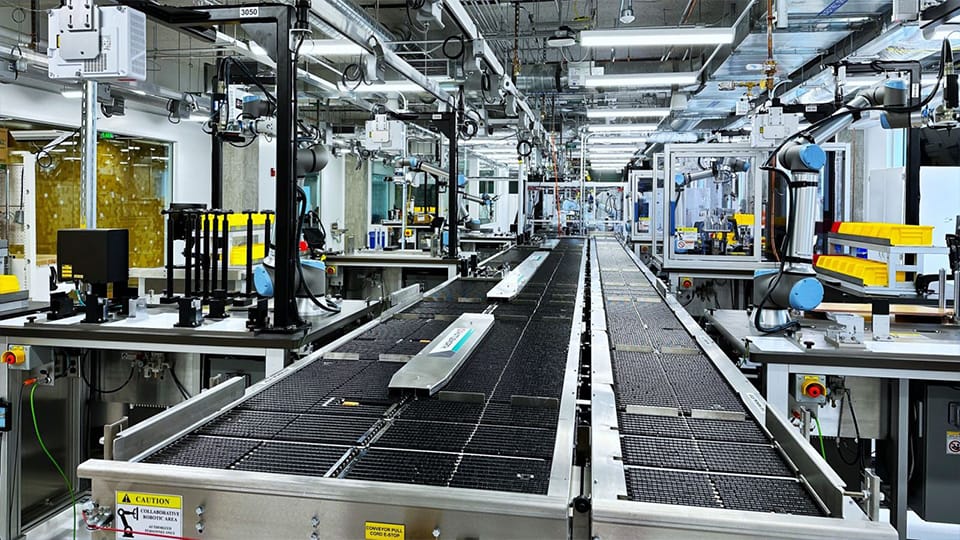Purdue to dedicate smart manufacturing facilities
Subscriber Benefit
As a subscriber you can listen to articles at work, in the car, or while you work out. Subscribe Now
The School of Engineering Technology at Purdue Polytechnic Institute will dedicate four new smart manufacturing facilities on the West Lafayette campus Thursday. Purdue says the facilities create the most expansive learning ecosystem of its kind in the country.
The facilities are part of a broader effort at Purdue that dates back to 2018 to create a new degree program in smart manufacturing with the goal of preparing the next generation workforce and bridge the growing skills gap in the manufacturing industry.
“You’re going to have all these jobs that are going to remain open because of the baby boom generation that are retiring [and] fewer people going into manufacturing,” said Purdue Professor Ragu Athinarayanan. “Compound that with the fact that we have the widening skills gap, because of the fact that we are beginning to use technologies like IoT, AI, machine learning, intelligent robotics and the like. So this is just going to exacerbate the problem.”
A recent report from Deloitte on the outlook for the manufacturing industry in 2024 showed that 86% of manufacturing executives surveyed believe smart factory solutions will be the primary driver of competitiveness in the next five years.
Athinarayanan said Purdue recognized the challenges facing manufacturers early, which led to the creation of the institute’s Smart Manufacturing Industrial Informatics bachelor’s degree program.
“We want students to not only master the concepts of smart manufacturing, but we also want them to build skills and competencies related to the same,” he said. “So as much time and effort that they’ve put into building the curriculum, we have put equal amount of time and effort, perhaps even more, in building our facilities.”
The facilities, Purdue said, are the final component in establishing the degree program, which focuses on Industry 4.0. Athinarayanan said the university wants graduates to become “change agents” for the manufacturing industry.
“They can help industries–small, medium or otherwise–go through this digital transformation, because we want to ensure that industries remain competitive,” he said. “And one of the ways of doing that is producing graduates who can help them become competitive.”
The facilities include the Smart Learning Factory, the Intelligent Process Manufacturing Laboratory, the Smart Foundry, and the Industrial IoT Laboratory. They are located within Dudley and Lambertus Hall on Purdue’s West Lafayette Campus.
“The Smart Manufacturing Industrial Informatics degree is the cornerstone of our commitment to advancing engineering technology education,” Purdue Polytechnic Dean Daniel Castro said in a news release. “These labs are not just facilities—they are incubators for innovation, where students can synthesize the full spectrum of Industry 4.0 technologies with hands-on problem-solving.”
Key to the development of the facilities, Athinarayanan said, has been the collaboration with industry partners who have been involved from the very beginning. Companies such as Microsoft, Accenture, Caterpillar, Fortinet, and Endress+Hauser have provided both input in curriculum development and equipment that students will be using.
“AI, data and other digital technologies are becoming the steam engines of the factories of the future,” Aaron Saint, who leads Accenture’s digital engineering and manufacturing service called Industry X in North America, said in a statement to IIB. “They herald massive change for the way people work on and around the shop floor, as well as how production lines are set up, and production facilities are run. The Smart Factory at Purdue that Accenture supports will give students the opportunity to work in this future already today.”
And more manufacturing companies are already coming to Purdue to learn about the degree program, which officially kicked off last year, and the new facilities.
We already have industries coming in [and] asking us for interns and for graduates. We don’t have enough to provide them because the program just started,” Athinarayanan said. “But industry is already seeing value in the program, so they have begun engaging with us, and they’ve also started engaging with our faculty, to see how we can help them address some of their immediate needs. So, we have already started working with industries across various domains to help them move towards this digital transformation.”
And Purdue Polytechnic is already looking toward growth for the degree program. Currently, it is an undergraduate program, but Athinarayanan said there are plans to bring it to the graduate level as well.
“The undergraduate program, across four years, provides them a broad overview of the various industry 4.0 technologies,” he said. “But in the graduate program, we can begin honing in those skills across maybe one or two, technology verticals so that they can then be experts or specialists in those areas.”
